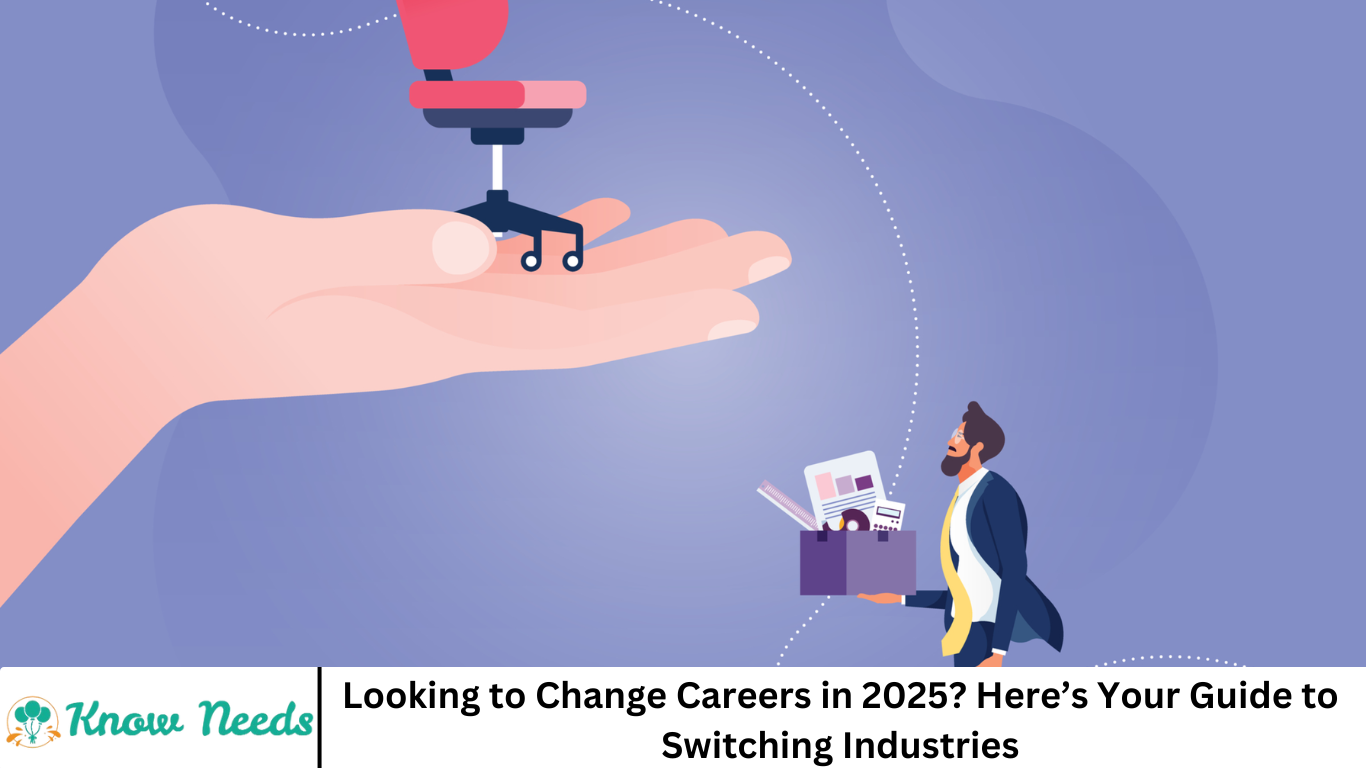Are you feeling stuck in your current job or industry? Maybe you’re craving more passion, better growth opportunities, or simply a fresh start. Changing careers can be one of the most rewarding decisions you make — especially in 2025, when industries are evolving rapidly thanks to technology, shifting markets, and new job demands.
But career transitions don’t happen overnight. To successfully switch industries, you need a clear plan, the right skills, and a mindset geared for growth. This comprehensive guide will walk you through everything you need to know about changing careers in 2025, from identifying your motivations to landing your dream role in a new field.
Why Consider a Career Change in 2025?
The job market in 2025 is dynamic. Emerging technologies like artificial intelligence, green energy, and digital health are reshaping entire industries. This means opportunities abound — but they require new skills and flexibility.
Some common reasons people pursue career changes today include:
- Burnout or dissatisfaction: You may feel unfulfilled or stressed in your current role.
- Desire for growth: Some industries have limited upward mobility or growth potential.
- Better compensation: Switching fields can sometimes lead to higher salaries or benefits.
- Pursuit of passion: You want your work to align more closely with your interests or values.
- Market changes: Your current industry might be shrinking or becoming obsolete.
Recognizing your “why” is crucial because it fuels your motivation throughout the transition process.
Step 1: Self-Assessment — Understand Your Strengths and Interests
Before diving into a new field, take time to evaluate your skills, passions, and values. Ask yourself:
- What tasks or projects have I enjoyed most in my career so far?
- What skills do I excel at, both hard (technical) and soft skills (communication, leadership)?
- What kind of work environment suits me best (remote, fast-paced, collaborative)?
- What are my core values, and how do they align with potential new industries?
Tools for Self-Assessment:
- Personality Tests: Tools like Myers-Briggs Type Indicator (MBTI) or the Big Five can reveal insights about your working style.
- Skill Assessments: Platforms like LinkedIn Skill Assessments or Coursera can help identify and validate your abilities.
- Career Coaching: A professional coach can guide you through tailored exercises and provide objective feedback.
Step 2: Research Potential Industries and Roles
Next, explore industries that excite you and align with your strengths. Popular growth industries in 2025 include:
- Technology: AI, cybersecurity, software development, data science.
- Healthcare: Nursing, health tech, mental health services, telemedicine.
- Sustainability & Green Energy: Renewable energy, environmental consulting.
- Finance & FinTech: Digital payments, blockchain, financial analysis.
- Creative & Digital Media: Content creation, digital marketing, UX/UI design.
How to Research Effectively:
- Industry Reports: Look at reports from organizations like McKinsey, Deloitte, or the Bureau of Labor Statistics.
- Job Portals: Browse job descriptions on LinkedIn, Indeed, or Glassdoor to understand role requirements.
- Informational Interviews: Connect with professionals in your target industry to gain firsthand insights.
- Networking Events & Webinars: Attend industry-specific meetups or virtual panels to stay current on trends.
Step 3: Identify Skill Gaps and Get Qualified
Once you’ve pinpointed a new industry and roles, compare your current skills to those required. This will reveal your skill gaps.
Common Skill Gaps for Career Changers:
- Technical skills: For example, coding languages in tech, data analysis, or specialized certifications.
- Industry knowledge: Understanding regulations, market dynamics, or customer needs.
- Soft skills: Communication styles, leadership in new contexts, or teamwork in different environments.
How to Bridge the Gap:
- Online Courses: Platforms like Coursera, Udemy, LinkedIn Learning, and edX offer flexible courses.
- Certifications: Consider recognized certifications like PMP for project management, CompTIA for IT, or Google Analytics for marketing.
- Bootcamps: Intensive programs for fields like coding, UX/UI design, or data science.
- Volunteering or Internships: Gain practical experience and build your resume.
Step 4: Rebrand Yourself — Resume, LinkedIn, and Personal Branding
Your resume and online presence are your marketing tools. Tailor them to highlight transferable skills and relevant experience.
Tips for Effective Career Transition Resumes:
- Focus on Transferable Skills: Emphasize skills like project management, communication, problem-solving.
- Use Industry Keywords: Mirror the language used in job descriptions.
- Quantify Achievements: Highlight measurable successes.
- Include Relevant Projects: Showcase side projects, freelance work, or certifications.
LinkedIn Profile:
- Update your headline to reflect your target role or industry.
- Write a compelling summary explaining your career transition story.
- Join industry groups and follow thought leaders.
- Request recommendations that emphasize your adaptability and skills.
Step 5: Network Strategically
Networking is often the most powerful tool for career changers.
Ways to Build a Network in a New Industry:
- Leverage Existing Contacts: Ask friends, former colleagues, or mentors for introductions.
- Attend Industry Events: Conferences, meetups, or webinars provide great opportunities to meet insiders.
- Join Professional Associations: Many industries have associations with networking and educational events.
- Online Communities: Engage on LinkedIn, Reddit, or specialized forums.
- Informational Interviews: Reach out politely to professionals to learn more about their roles and career paths.
Step 6: Prepare for Interviews
Interviewing in a new industry can be intimidating, but preparation is key.
How to Prepare:
- Understand Industry Jargon: Research common terms and trends.
- Practice Behavioral Questions: Be ready to discuss how your past experiences relate to the new role.
- Prepare Your Story: Explain clearly why you’re switching careers and how your skills add value.
- Show Enthusiasm: Demonstrate passion for the new industry.
- Have Questions Ready: Ask about the company culture, growth opportunities, and expectations.
Step 7: Stay Resilient and Keep Learning
Career transitions can take time — sometimes months or even longer. Stay patient and adaptable.
Tips for Staying Motivated:
- Set short-term goals and celebrate small wins.
- Keep learning and upskilling regularly.
- Build a support system with friends, mentors, or career coaches.
- Stay open to entry-level roles or contract work that can build experience.
Bonus: Top Resources for Career Changers in 2025
- LinkedIn Learning: Courses on business, tech, and creative skills.
- Coursera & edX: University-level online classes.
- Glassdoor: Company reviews and salary insights.
- Meetup: Find local or virtual industry events.
- Career Coaching Platforms: BetterUp, The Muse, or local services.
- Job Boards: Indeed, AngelList (for startups), FlexJobs (remote roles).
Frequently Asked Question
How do I know if it’s the right time to change careers in 2025?
If you feel unfulfilled, burnt out, or see limited growth in your current role — and you have a clear idea of what you want next — it might be the right time. The evolving job market in 2025 offers many new opportunities, so timing can also depend on your readiness to learn and adapt.
What industries are best for career changers in 2025?
Growth industries in 2025 include technology (AI, cybersecurity, data science), healthcare (telemedicine, mental health), green energy, finance/FinTech, and creative digital media. These fields are expanding and open to newcomers with the right skills.
How can I identify which career suits me best?
Start with a self-assessment to understand your skills, interests, and values. Use personality tests, skill inventories, and career coaching if needed. Also, research industries and talk to professionals to see what fits your lifestyle and goals.
What are transferable skills, and why are they important?
Transferable skills are abilities like communication, problem-solving, leadership, and project management that apply across various industries. Highlighting these skills helps employers see your potential even without direct experience in their field.
How can I gain experience in a new industry without previous work history?
Consider online courses, certifications, volunteering, internships, freelancing, or side projects. These help build relevant skills and show initiative to potential employers.
How important is networking when switching careers?
Networking is critical. It helps you learn about industry trends, uncover hidden job opportunities, and get referrals. Attend events, join online communities, and conduct informational interviews to build connections.
What should I include in my resume to make it suitable for a new industry?
Focus on transferable skills, relevant certifications, and any projects or experience related to the new field. Tailor your resume keywords to match job descriptions and highlight achievements that demonstrate your adaptability and value.
Conclusion
Changing careers in 2025 is a bold but achievable move. With rapid changes in the job market, there’s never been a better time to realign your work with your passions and strengths. By conducting honest self-assessments, researching industries, upgrading your skills, rebranding yourself, networking strategically, and preparing thoroughly, you’ll position yourself for success in a new field. Remember, every career pivot is a journey. Stay resilient, stay curious, and embrace the exciting opportunities ahead.


